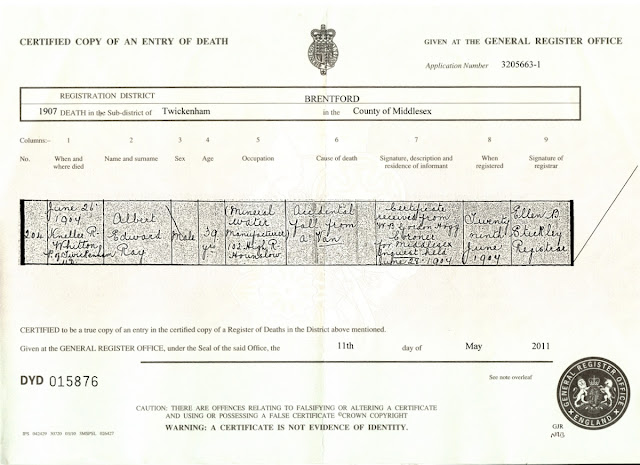
The line between comfort and poverty was a short one for a widow in Edwardian England. Bert's mother, Emily, chose to work to support her family, but it was a struggle to maintain six children, her aged mother-in-law, a job and a business.
In 1908 Bert's Aunt Rosa, his father's sister, also died. She was 44, with four living children, two girls aged 22 and 20 and two boys aged 10 and 6. Her husband, Henry Smith, was a foreman in a market gardener in Cheshunt, Essex, to the north of London, about 30 miles from Hounslow .
It seems likely that one of the housekeeping jobs Bert's mother took on was for Henry Smith.
Eliza Ray, widow of Thomas Ray, and Bert's grandmother, died in April 1910.
Also in April 1910, Emily Grace Ray married Henry Smith in Hounslow and moved, with her children, into his home in St Claire, Church Fields, Cheshunt, Essex. It would have seemed at the very least sensible. Both Henry and Emily had experience in market gardening, Henry's sons were around the age of Emily's younger sons and both families were struggling with a single parent.
The census of 1911 sees them as a blended family, living in Cheshunt. Bert is working as a mineral water traveller, presumably for the Hounslow business, but possibly for his Uncle Arthur's business at Bourne's Bridge, Hayes. Sid is working as a nursery hand, the five younger children are at school and Doll is helping out at home. The house has seven rooms - substantial for the time. Interestingly, it is Emily who fills out and signs the census - unusual for the time.
It seems a reasonable arrangement for all concerned. It was not, however, a lasting one. Henry Smith convinced Emily to sell the mineral water business that she inherited, along with any associated property and buy Brookfields, a smallholding in Eastwood, Southend. Emily seems to have taken the precaution of keeping the property in her name. Within a few years any money had been spent and Henry Smith told the family he was leaving. Doll was there when he made his announcement. Many years later she told her own children that she offered to clean his shoes to hasten his departure, such was the animosity she felt towards him.
It is hard to say how Emily felt about the arrangement, the sale of the business or about Henry himself. Perhaps it was from the start, a hard-headed business arrangement. Perhaps there was kindness and hope. Emily's children and extended family certainly felt she was used in the relationship. No one in Emily's family ever heard from Henry Smith again, and Emily seems to have expressed no regrets at his leaving. She turned to housekeeping work to support herself and her younger children, probably supporting her two nephews as well. (It is hard to trace Charles and Albert Smith.) She sometimes called herself Emily Grace Smith, sometimes Emily Grace Ray.
Bert looked for work and independence.



